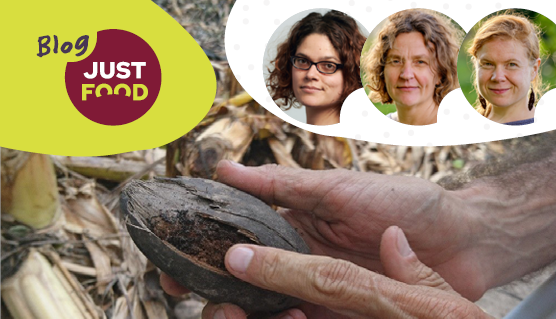
© Theresa Tribaldos
Transitioning to more healthy, sustainable and climate-friendly food systems is essential and urgent – to prevent catastrophic climate change, to revert the biodiversity crisis, and to achieve the UN sustainable development goals in general. So far the consensus. But such a transition involves fundamental changes in the ways how we imagine our food systems, how and what we produce, process, and eat, and how we treat animals and ecosystems.
"Who will or should bear the costs or reap the fruits of such transitions? Who should have a say in their planning and implementation? Answering these questions means engaging with the meaning of justice in transition processes."
We collected eight peer-reviewed research articles in a special issue that demonstrates the multidimensionality of justice in just food system transitions. The articles approach the aforementioned questions from different angles, in different cultural contexts, and on different spatial scales. They involve conceptual as well as applied research and give a good overview of the complexity of just transitions in food systems.
As a whole, the special issue makes two main points that should be highlighted specifically: 1) the deepening of conceptual understanding in just food system transition; and 2) addressing power imbalances.
Deepening conceptual understandings
Addressing just transition from the perspective of dietary changes raises issues that go beyond bearing costs and reaping fruits. They challenge fundamental values of a good life and wellbeing in different cultural contexts and require deep reflections on who is to make decisions about these changes. Questions of whose values count as legitimate and who is entitled to participate in decision-making should be considered as minimum requirements.
Distributive justice, in which farmers undoubtedly play a key role in transitions towards climate-friendly food systems, is therefore only one part of a multidimensional understanding of justice.
To address commonly invisible concerns and vulnerabilities, it is critical to consider other dimensions, such as global fairness and relations to distant actors, ecological integrity and justice to animals, socio-cultural respect, and capacity building to make food system actors fit for transition.
Addressing power imbalances
Power imbalances are structurally enshrined in many of our currently faced food system challenges yet often they do not receive the necessary attention. When demands are raised for equal participation at the negotiation table, the unequal starting points in terms of power and financial resources are often ignored.
If just transition is truly to be supported, transparent processes and the recognition of less powerful groups, listening to their voices as well as giving them more room in contested public spaces is needed. Organizing such negotiations requires thorough reflections about institutional representation and how to empower the often invisible and unheard actors. Capacity building is a crucial part of such support and needs more consideration and the necessary resources.
Did these questions intrigue your imagination? Do you want to learn more about just food system transitions?
Visit our special issue and read the peer-reviewed articles (all open access).
Theresa Tribaldos, Minna Kaljonen and Teea Kortetmäki